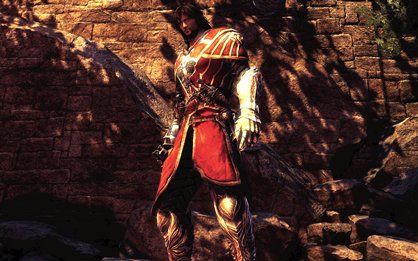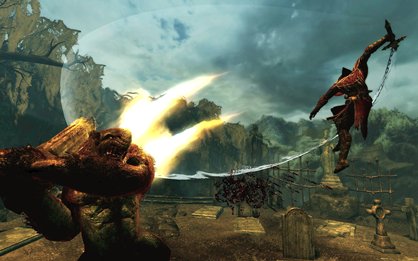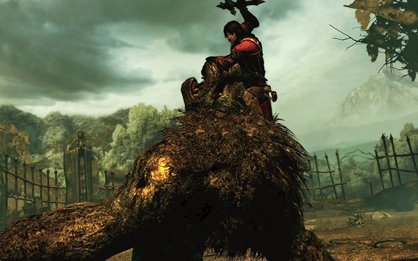In this in-depth interview with Dave Cox, producer at Mercury Steam, we learn how to kill ice titans in Castlevania’s latest attempt at turning 3D without crushing the spirit that has made the series so great.
Work on Castlevania: Lords of Shadow is well underway. How did it feel when Uncharted 2 redefined people’s expectations of third-person action games? What does it do well and how can you raise the bar?
Dave Cox: Uncharted 2 is a great game and I enjoyed it immensely. The standouts are the story and voice acting, which Castlevania does well. We’ve got a great script and stellar actors like Patrick Stewart, Robert Carlyle, Jason Isaacs and Natascha McElhone. Visually, Uncharted 2 is beautiful and it impresses me technically. But does Uncharted 2 redefine 3rd person action games? I don’t think that it does. For me, it was a very highly polished, very well constructed 3rd person game but not a redefinition of the genre. It’s a high point but not a redefinition. Plus, Uncharted was a single format release. If any game is going to set a benchmark for a genre it would need to do so across multiple platforms.

It’s a moot point, as Castlevania isn’t actually trying to compete with Uncharted. I would suggest Prince of Persia would be nearer the mark. I don’t think that games production is about one-upmanship. ‘Raising the bar’ is an unusual phrase when you’re talking about critical evaluation of content. It’s more something I’d tie to technical advancements. If you look at other media, like film, it’s not a normal topic that’s raised except with a very few cutting edge movies. I’d prefer to focus on content. The engine and behind the scenes structures simply support what the player experiences. I want people to walk away feeling satisfied; that they’ve enjoyed what they’ve seen and done.
Castlevania delivers on all those things in spades. There are moments in this game, either in story development, or visual spectacle, or gameplay that deliver shivers and thrills and they will give players a memorable, emotional experience they won’t soon forget.
How does the combat system evolve? What will we be able to do at the end of the game that we would have only dreamt of at the start?
You need to think carefully about how to defeat enemies. Button mashing will get you killed, so we give the player options, and lots of them, to tackle combat their way.
Sign up to the GamesRadar+ Newsletter
Weekly digests, tales from the communities you love, and more
You start the game with your Combat Cross and some basic moves. During the first stage, you’re introduced to the secondary weapon system and given daggers. Shortly after, you get new combos. Combos are purchased with experience. You kill enemies, gain experience and once you have enough, you can purchase new moves from a wide range.

Later on, we introduce a magic system that can be combined with your main weapon and secondary weapons in new ways – you can use flaming daggers, for example, which can cause more damage than regular ones. There are also powerful relics to collect that give Gabriel new abilities and can also be combined with magic.
Secondary weapons can be upgraded… for example, Dagger Wave can throw five daggers in a fan and stun certain enemies, allowing you dispatch the foes at will. The Combat Cross can be upgraded at mausoleums. Upgrades might allow you to grip onto enemies or scenery, opening up a new move set. So, you can perform combo attacks on an enemy from a distance, throw a flaming Dagger Wave to stun the enemy, grip them with your Combat Cross, pull them towards you, change your magic focus to create a temporary shield that will protect you, flip to damage output magic, then slice and dice them at close quarters without taking any hits.
How do you feel about the comparisons between CLOS and other third-person action adventures, such as God Of War 3, Dante’s Inferno and Bayonetta, to name but a few?
People like to pigeonhole everything, so they can try to understand what it is they think we’re doing. What makes me smile is that we’re simply making Castlevania in 3D. We’re basing our game on the 8 and 16-bit adventures that defined the Castlevania series. For many, Castlevania is defined by Symphony of the Night and all of the games that have come after, so they might not understand what this game is about.

Although I think God of War is a great game, we set out to make a modern Castlevania game that took inspiration from the original concept, a concept that predates God of War by decades. For me, the biggest competitor is Prince of Persia, because it’s a mixture of combat, platforming and puzzles with some exploration.
How does C:LOS link to, and develop, the storyline?
Lords of Shadow isn’t connected to previous Castlevania games. It doesn’t link to them nor is the story tied to any previous plots. It’s a new take on the mythology.
Instead, this is year zero. We did this because the series has been running for a very long time and the plot had become somewhat convoluted. So we decided to start again, to help new players jump right in without any prior knowledge of Castlevania.
Fans of the series will see many familiar things, though. There are lots of homages and nods to the series in general. I’m sure that old school Castlevania fans will be delighted with the game – especially fans of the 8 and 16-bit adventures. But this is a modern take on the classic, so expect things to be different.


